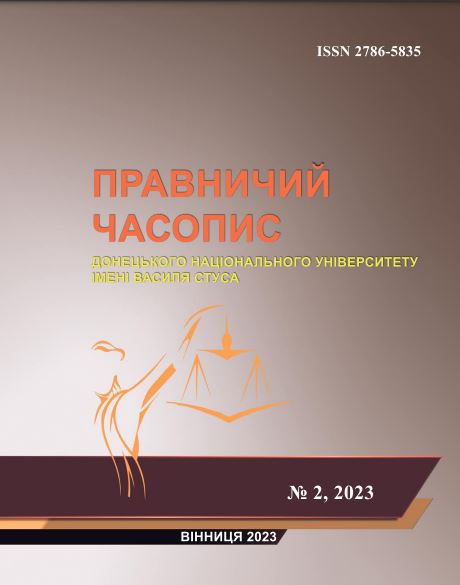The development of liberal legal ideas in the XIX–XX centuries
DOI:
https://doi.org/10.31558/2786-5835.2023.2.3Keywords:
liberalism; freedom; legal principle; legal ideology; human rights; legal idea; legal teachingAbstract
The article analyzes the main legal doctrines of the XIX–XX centuries which formed the basis of modern legal liberalism. The author highlights the positions of classical liberalism of B. Konstan based on the principles of personal independence of a person from the state, negative freedom and indifference to the forms of the state system. Mill singled out a liberal trend in political and legal views: from the unsuccessful pursuit of people’s power, popular sovereignty, control of power to personal rights and freedoms.
The article concludes that liberalism of the XVIII–XIX centuries. it is a transition from belief in the saving role of the people’s state and the republic and the realization of human freedom, marked by the French Revolution, to the defense of personal freedom and independence, rights regardless of any state forms. The basic type of freedom for classical liberal ideology is negative freedom as the prohibition of interference, understood in two ways: from the state and from the person.
The views of J. Rawls, who stands at the origins of the traditions of social liberalism, are analyzed. The problems of social justice at the beginning of the 20th century are particularly relevant and acute and the struggle for social and labor rights is being waged. Therefore individual freedom, independence and private property can no longer ignore the problem of social inequality, lack of equal opportunities and the need for protection of certain categories of citizens
The views of Ludwig von Mises who is a leading representative of the liberal theory of the beginning of the 20th century, are studied. He emphasized that the program of liberalism should be understood as property that is, private ownership of the means of production. All other positions of liberalism stem from this fundamental requirement.
The author concludes that representatives of classical liberalism believe that by providing a person with complete freedom and independence absolute private property, well-being will come by itself. However, life experience has shown that this approach once again generates a new class property inequality and a struggle for the social face of this ideology. Not just any legislative prescription is liberal it should be a universal norm that minimizes the state’s interference in a person’s life and also eliminates the possibility of another private will to which a person must obey.
References
Constant B., Political Writings. New York: Cambridge University Press/edited by Biancamaria Fontana 1988. 310 p.
Mortimer N. S. Sellers Republicanism, Liberalism, and the Law. 1997. Kentucky Law Journal. Volume 86 (1)p. 1–31.
Mill J. St., On Liberty. Batoche Books Kitchener. 2001. Ontario. Canada. 109. https://socialsciences.mcmaster.ca/econ/ugcm/3ll3/mill/liberty.pdf
Rawls, J., (1999) Theory of Justice, Harvard University Press, Cambridge. pp. 266
Berlin I., Two Concepts of Liberty, Four Essays On Liberty, Oxford, England: Oxford University Press, 1969. p. 118-172.
Austin J. The Province of Jurisprudence Determined. Cambridge University Press. 1995.
Hobhouse L.T., Liberalism. Oxford Univ. Press, 1964. 144 р.
Hayek F., The Constitution OF Liberty. The University of Chicago Press, 1960. 596р.
Locke J., Second Treatise of Government, C. B. Macpherson ed., Hackett Publishing Company. 1980. 152р.
Macpherson C. B. The Political Theory of Possessive Individualism: Hobbes to Locke. Oxford University Press. 2011. 328р.
Brian Z. Tamanaha The Dark Side Of The Relationship Between The Rule Of Law And Liberalism. NYU Journal of Law & Liberty. Vol. 3: 516. 2008р. 516–544.
Корнієнко Г. П. Обґрунтування прав людини: від класичного до сучасного лібералізму. Науковий вісник Міжнародного гуманітарного університету. Сер.: Юриспруденція. 2019 № 37. С. 18–21.
Mises L. Liberalism: The Classical Tradition. 1927 (LF ed.). Liberty Fund, 1962. URL: https://oll.libertyfund.org/title/greaves-liberalism-the-classical-tradition-1927-lf-ed

